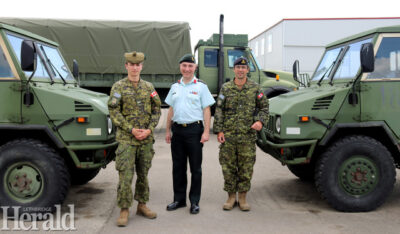Recruiters seeking interest in Canadian Army Reserve
By Alejandra Pulido-Guzman - Lethbridge Herald on July 26, 2023.
 Herald photo by Alejandra Pulido-Guzman
Member of the Calgary Highlanders, Corporal Aydan Chartrand, Commander of the 41 Canadian Brigade Group, Colonel Christopher Hunt and Major Mitch Montminy from the 20th Independent Field Battery, Royal Canadian Artillery during a recruiting tour at the Vimy Ridge Armoury.
Herald photo by Alejandra Pulido-Guzman
Member of the Calgary Highlanders, Corporal Aydan Chartrand, Commander of the 41 Canadian Brigade Group, Colonel Christopher Hunt and Major Mitch Montminy from the 20th Independent Field Battery, Royal Canadian Artillery during a recruiting tour at the Vimy Ridge Armoury.LETHBRIDGE HERALDapulido@lethbridgeherald.com
Members of the Canadian Army Reserve visited Lethbridge earlier this month in hopes of recruiting residents who wish to become a member of the army while also living civilian lives.
Commander of the 41 Canadian Brigade Group, Colonel Christopher Hunt spoke to the Herald about their recruiting efforts, what reservists are and the benefits of becoming an Army Reservist.
“The Army Reserve is a component in the Canadian army made up of part-time professional soldiers who serve from their communities. They typically have full-time civilian jobs or going to university or college or trade school,” said Hunt.
He said reservists usually engage in their army reserve activities once a week, two weekends per month and couple of weeks during the summer months. He added that for those in post-secondary, they can take courses related to their field of studies during the summer.
“We also offer full-time summer employment, so it’s an excellent opportunity for post-secondary students because you’ve got a part time job during the year and then they can have a full time job from the start of May until the end of August, and that’s typically when we try and put them on some of the more advanced training courses where they can get a lot of work experience as well,” said Hunt.
He said reserves are there to provide depth to the Canadian Army on a voluntary basis. There are just over 40,000 soldiers in the Canadian Army and just under 20,000 are from the reserves.
“We can volunteer for domestic or expeditionary operations, so when there were wildfires recently up in central and northern Alberta, we identified 135 reserve volunteers from here in Alberta, they quickly formed into a team, received an extra day of firefighting training specifically, and then they were deployed into Drayton Valley to help protect that community and spend just over a week there,” said Hunt.
He said in the past year they had about 50 reservists from Alberta deployed over to eastern Europe and to the Middle East on a few different missions.
 “In total we’ve got about 1,700 reservists here in Alberta spread out across nine units. We’ve got detachments in Medicine Hat, Lethbridge, Calgary, Red Deer and Edmonton, and also a small detachment up in Yellowknife in the Northwest Territories,” said Hunt.
 He said here in Lethbridge the 41 Canadian Brigade Group is represented by the 20th Independent Field Battery, Royal Canadian Artillery, as well as a troop from the South Alberta Light Horse, and a small detachment from the Calgary Highlanders.
Hunt said the 20th Independent Field Battery, Royal Canadian Artillery supplies artillery crews for avalanche control in the Rogers Pass for up to three months of duty.
 “Typically, they fire several hundred artillery shells helping keep the highway open, so they make avalanches and snowplows come in and clean it all up so that pat vital artery remains open and the experiencing gain there actually sets them up extremely well if they wanted to deploy internationally,” said Hunt.
He said all deployments are voluntary and in order for there to be a mandatory call-up the federal government has to order it, and the last time that happened was at the start of the Second World War.
“Our soldiers want to deploy, they want that experience, they want to serve as part of the army, and what’s great about the reserves is that they can do that from their home, and if they move from their hometown wherever their new hometown is they can choose to do it from there as well,” said Hunt.
 He said that is one of the big differences with serving in the regular force where they send people to serve at a specific place and they have to move to that location to work full-time, while the reserve provides them with the flexibility of serving part-time from anywhere.
 “We also offer a wide range of occupations, so it’s not just combat soldiers. We’ve got human resource and financial administrators, we’ve got communication specialist, logistics specialists, cyber security experts, we’ve got vehicle mechanics, technicians of all sorts as well, and people can join without any training,” said Hunt.
 He said they are working with post-secondary institutions to ensure the training reservists receive gets accreditation.
 “We’ve been doing a lot of work recently to get military qualifications recognized by the civilian institutions so it provides credit towards courses, so even if it doesn’t match up entirely, that veterans or reservists can take a much-abbreviated version of the course and receive credit for their prior learning,” said Hunt.
 He said they are also trying to do it the other way around, where they recognize civilian qualifications and provide accreditation for them.
For more information and to apply visit forces.ca
Follow @APulidoHerald on Twitter
23-22


